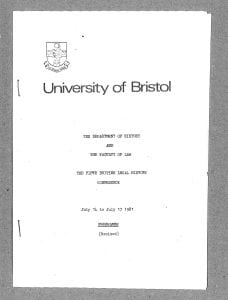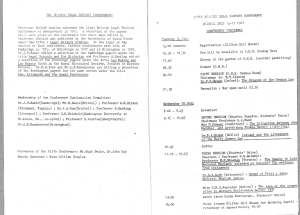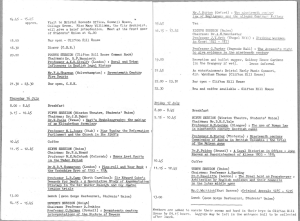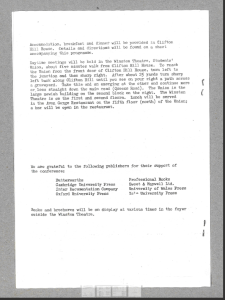If it has escaped anyone’s attention, the Bristol legal historians are gearing up to host the British Legal History Conference 2024 (3rd-6th July 2024, since you ask, and yes, booking is now open … ‘early bird’ rate available until 31st March …). It has been a long time since the BLHC came to these parts: the last time Bristol was the venue was July 1981.
Recidivist BLHC attendee and Welsh Legal History Society luminary, Richard Ireland, has kindly passed on the programme from that last Bristol BLHC, and a very interesting document it is too. So, what were the legal historians of 1981 up to, in that time of Mrs Thatcher in 10 Downing Street, the Specials topping the charts with ‘Ghost Town’ (so the internet informs me), and many people feverishly buying up Charles and Diana tea-towels …?

The cover shows us that the fifth BLHC was a joint effort between the Department of History and the (late) Faculty of Law. That, perhaps, brings up some interesting thoughts about the relationship between the two main disciplinary bases for legal historians, which we might well reflect upon when we meet in July. The imperfect appearance of the text, typewritten and photocopied, may mist the eyes of some who remember the pre-computerised world. (Those marks on the left hand side are staples, future legal historians and BLHC attendees of many years hence – a primitive method of attaching together hard copies of information, on the now-obsolete medium known as ‘paper’. Yes, the past is a very foreign country.)



The first page gives us a little history of the conference, and the names of the Continuation Committee (conference ‘regulars’ may recognise one or two familiar names here) and the Bristol convenors of the time. The gender balance in the committee and the use of ‘Miss’ and ‘Mrs’ for female academics may be noted.
The programme itself includes some famous names in the legal history field, and in history more generally, and there are representatives from the UK and other, mainly common law, jurisdictions. It presents an interesting contrast to BLHCs of the modern era in its heavy medieval/early modern focus, and its (unsurprisingly) predominant ‘classical legal history’ look, as opposed to much on gender or colonial/imperial issues.
With my ‘co-convenor’ hat on, I notice that the 1981 conference was, also, clearly, on a rather smaller scale, with one strand of sessions throughout, rather than the abundance of choice we expect, and are able to offer, these days. There is something attractive about a more uniform experience (and the evident ease with which a small conference could, in those days, be accommodated within the university estate) and I imagine that the business of putting on a conference was also simpler in a less financially-pressed and less commercialised university environment, but I am rather glad not to have had to select a programme of just 22 papers, given the number of very good submissions we received for the 2024 version, and to be able to try to open up legal history to a wider group of scholars.
I note, finally, the 1981 programme’s emphasis on the opening hours for bars (allowing delegates to plan their evenings down to the last drink) and hope that, while the 2024 conference will be a little different, it can retain enough of the evident enjoyment of good scholarship and the good company of legal historical friends old and new which comes across the years in this little piece of BLHC past.
Cheers, and I hope to see many of you in Bristol in July!
Gwen
